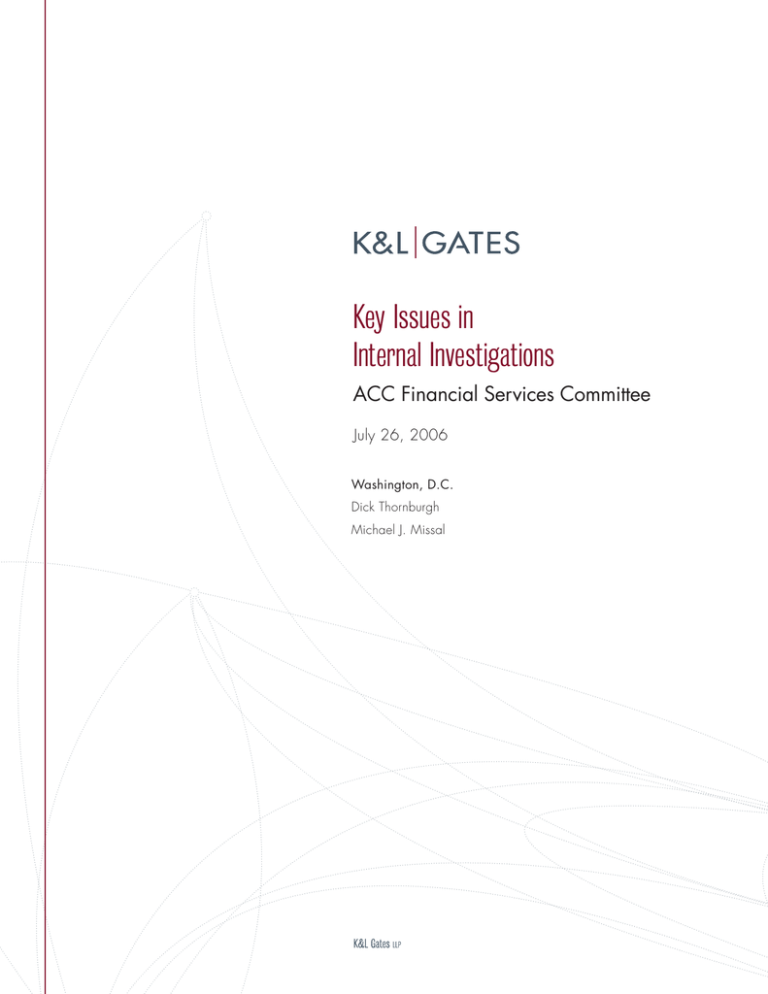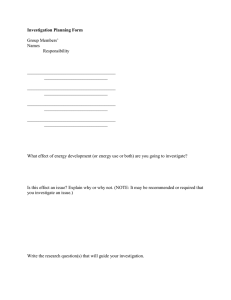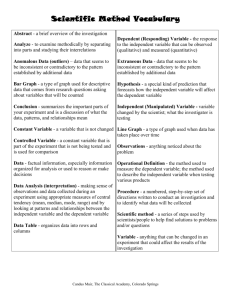
Key Issues in
Internal Investigations
ACC Financial Services Committee
July 26, 2006
Washington, D.C.
Dick Thornburgh
Michael J. Missal
Introduction
Virtually every major public corporation has conducted at least one significant
internal investigation in the past few years. The reasons for this development
are many, including the post-Sarbanes-Oxley environment and the policies of
the Department of Justice, the Securities and Exchange Commission and other
law enforcement agencies that state that credit may be given for conducting
internal investigations. While high profile internal investigations have occurred
in every major corporate scandal, such as WorldCom, Enron, Adelphia,
and Tyco, they have also been employed in far more discrete and less
significant matters.
If a governmental investigation is already underway, it may be problematic
for the law firm representing the company in that investigation to also conduct
the internal investigation. Given that the goals of representing a company in
a governmental investigation and conducting an internal investigation are not
entirely consistent, questions may be raised whether the law firm defending the
company can be properly objective in conducting the internal investigation. If
the allegations are significant, it is likely more effective not to have a law firm
perform both roles.
Every internal investigation will have unique issues, circumstances, dimensions,
challenges, and outcomes. While an internal investigation can provide great
benefits to a corporation and its senior executives and directors, it can cause
serious harm if it is not conducted properly. This paper identifies and discusses
many of the key issues that arise in internal investigations. Because each
investigation is different, the responses to these issues may change depending
on the individual circumstances. Further, this list is not all inclusive and there are
many additional issues that will need to be addressed in each investigation.
III. Who should control the investigation?
I. When should an internal investigation be conducted?
Determining whether to conduct an internal investigation should be considered
carefully. Once the decision is made to conduct an investigation, it typically
must be completed. If an investigation is halted before it is completed, it can
lead to claims of a cover-up or failure to ascertain the facts.
Internal investigations typically should be conducted when there have been
credible allegations or suspicions of significant wrongdoing, misconduct
or ethical lapses. There are many factors that are important in determining
whether an internal investigation should be conducted, including the
magnitude of the alleged harm, the existence of any governmental inquiry, the
number of employees involved, the duration of the alleged wrongdoing, the
prior disciplinary history of the company, the culture of the company and the
aggressiveness of the Board. Internal investigations may also be appropriate
even if there have not been specific allegations against a company, but
there haves been allegations of misconduct within the industry or against
a competitor. A current example is whether a public corporation has any
issues related to the backdating of stock option grants. It is not uncommon for
problems at one company to be present at a similarly situated company.
II. Who should conduct the internal investigation?
Internal investigations need to be credible and are typically most effective
if they are perceived as being truly independent from the company. Thus,
they are typically done by an outside law firm which has not done extensive
work for the company. An outside law firm that has experience in conducting
internal investigations likely can conduct them more effectively and efficiently.
While there are significant benefits to having an outside law firm that has
not done much prior work for the company conduct the investigation, it may
result in higher costs since the law firm will have a greater learning curve with
respect to the structure, business and culture of the company. If specialized
expertise is needed, the outside law firm may need to retain experts, such as
accountants, trading specialists or forensic investigators.
Internal investigations are typically controlled by the Board of Directors, the
Audit Committee of the Board or a specially created Committee of the Board.
If there have been any allegations or suggestion that a Chief Executive Officer,
General Counsel or member of the Board engaged in wrongdoing, those
persons should not have any involvement in, or influence over, the investigation.
An engagement letter should detail the identity of the client, the scope of the
investigation and establish the appropriate privileges.
IV. Should in-house counsel be involved in conducting the
internal investigation?
To maintain the independence and integrity of the process, it is usually
better for in-house counsel not to be involved in conducting the investigation.
However, it is typically appropriate and beneficial for the company to
designate an employee to act as a “facilitator” for the law firm conducting
the investigation to identify sources for relevant documents and to assist
in arranging interviews, and performing other administrative tasks.
This “facilitator” does not necessarily have to be a member of the legal
department, and should not otherwise participate in the investigation or be
privy to the findings.
V. H
ow should an internal investigation be organized
and initiated?
While every internal investigation is organized differently, there are certain
characteristics that are common to each. First, careful attention should be given
to putting together the correct team of lawyers and any necessary experts.
Since an important objective of an internal investigation is to ascertain the
facts in an objective manner and not advocate a position, it is important to
have lawyers who understand this role. Second, a lead lawyer should be
designated to coordinate and supervise the investigation, and serve as the
primary editor of any written report. If the investigation covers a number of
different issues, it may be beneficial to create issue teams and to have a
leader for each team. Third, a workplan should be prepared and revised as
necessary so that the team clearly understands the issues to be investigated
and the responsibilities of each team member. Fourth, there should be frequent
communications among the team as it is important that everyone be aware of
developing issues and facts. If it is a large investigation involving a number
of lawyers, weekly or more frequent status reports are important. Fifth, the
confidentiality of the work product should be maintained. Any premature leaks
of information will make it harder to get candid responses during interviews
Key Issues in Internal Investigations
2
and will challenge the integrity of the process and any privilege claim. Sixth,
efforts should be made to minimize the disruption to the ongoing business.
While internal investigations are certainly important and should be conducted
expeditiously, they can cause harm if they create anxiety among employees or
cause other damage to the company.
VI. How should privileges be maintained?
Preserving the attorney-client and attorney work product privileges may be one
of the toughest challenges in conducting an internal investigation, particularly
if the decision has been made at the outset to release publicly a written
report. Given the complexity of this issue, it is not possible to analyze fully in
this paper the numerous factors that must be considered. As a general rule,
if information is not maintained in a confidential manner, then it will make it
more difficult to maintain any privilege. For example, if a written report is to be
publicly released, it will be difficult to maintain the attorney-client privilege.
At a minimum, the engagement letter should make clear that a purpose of
the investigation is to give legal advice. In addition, steps should be taken to
limit the number of people with access to the process and information as the
investigation is ongoing. Moreover, all documents prepared should contain a
“privileged and confidential” legend.
VII. Should notice of the internal investigation be given
to employees?
With certain exceptions, a notice of the internal investigation generally
should be provided to all employees so that they understand the purpose and
nature of the investigation. Otherwise, inaccurate and damaging rumors may
permeate the company. Employees should be told that the investigation is
confidential and that they should not discuss the investigation or the underlying
issues with anyone.
VIII. H
ow should documents and other information
be preserved?
A request to preserve documents should be distributed promptly to all
employees who may have relevant information. The notice should provide
sufficient detail as to the scope of the internal investigation, but should not
telegraph the direction of the investigation or otherwise jeopardize its integrity.
In addition to distributing the document preservation notice, any corporate
document destruction policies related to potentially relevant documents should
be suspended. Further, relevant e-mails should be gathered from the computer
network and in some situations, the hard drives of relevant personnel should
be gathered promptly. Moreover, if there is a concern about the destruction of
documents, the office and files of impacted employees should be secured.
IX. How important are e-mails?
E-mails are a critical source of information given that they reflect the
contemporaneous and sometimes unfiltered state of mind of the sender.
Great efforts should be taken to gather e-mails and restore any that have been
deleted. E-mails should typically be reviewed and analyzed for each witness
who is interviewed. To facilitate the review, it may be beneficial to conduct
key word searches to identify the most relevant e-mails.
X. When and how should interviews be conducted?
Interviews are typically the most valuable source of information in an internal
investigation. It may be advantageous to conduct initial interviews at the outset
of the investigation to obtain a witness’ version of events before it may be
influenced by other factors and to get a narrative overview of relevant events.
These interviews may be conducted before documents are gathered and
analyzed. If such preliminary interviews are conducted, it may be necessary to
interview the most relevant people on more than one occasion after documents
are reviewed and interviews of all of the less significant witnesses have
been conducted.
Care should be taken not to be adversarial in interviews. If interviews become
contentious, it can cause an allegation of lack of objectivity and weaken the
credibility of the findings. The goal in interviews should be to obtain as much
information as possible and then test its accuracy against documents, other
testimony and any additional information obtained. In addition, a questioner
should be careful not to disclose what other witnesses may have said or
telegraph the direction of the investigation.
XI. Should interviews be recorded?
If a verbatim record of an interview is needed, then the interview should
be recorded. A verbatim record may be required if it is determined at the
outset to provide the government with the record of all interviews. Absent
this requirement, it is generally better not to record the interviews as a court
reporter may inhibit or chill a witness. In such situations, detailed notes of
the interview should be taken so that there is a comprehensive and accurate
record of the interview.
XII. Can an employee have a lawyer present at
the interview?
An employee generally should be allowed to have a lawyer present at
an interview if requested. However, there is no right to a lawyer and this
accommodation should not be used to delay significantly the timing of the
interview. Moreover, the lawyer for the witness should not interfere with the
questioning at the interview. To ensure that the record is complete as possible,
the lawyer for the witness may be given an opportunity to ask questions of
the witness at the end of the interview. Given that the goal of an internal
investigation is to gather the facts in as thorough and accurate a manner
as possible, this additional questioning could add important information to
the record.
XIII. Should a company pay for a lawyer for an employee?
Whether the company indemnifies the cost of a lawyer typically depends on
the past practices at the company, the by-laws, the seniority of the employee,
the rights to indemnity and the types of allegations being investigated. In most
cases involving senior officers, the company should pay for a lawyer. It should
be noted, however, that government regulators have requested in the past that
certain companies not indemnify employees who were targets or subjects of
investigations. In one challenge to this tactic, a U.S. District Court found that
such request was unconstitutional.
Key Issues in Internal Investigations
3
XIV. S
hould employees be offered the opportunity to submit
a “white paper” or similar materials?
XVI. Should the company or employees be allowed to
review the report before it is finalized?
It is critical that the findings of any internal investigation be accurate and
thorough. Thus, it may be beneficial to the process to obtain information from
different perspectives. One way to promote this objective is to give relevant
employees the opportunity to submit information that they believe is relevant.
This could include asking an employee to submit a “white paper” to respond
to a particular issue or question.
Typically, a written report should not be reviewed by anyone before it is
finalized to preserve its integrity and independence. However, in certain
situations, especially when the issues are of a highly technical nature, it may
be beneficial to let someone who is not implicated by the internal investigation
review the factual portion of a near-finalized draft to ensure the accuracy of the
report. The primary objectives of having an accurate and thorough report will
sometimes outweigh the potential harm to the integrity of the process by having
someone review the report before it is finalized.
XV. Should a written report be prepared?
Whether or not a written report should be prepared can be one of the more
difficult questions to resolve in any internal investigation. Written reports
generally add credibility to an internal investigation. Moreover, if a goal of
the investigation is to show cooperation with the government, then a written
report is likely required. However, unless there is a clear reason at the outset
to prepare a written report, it may make sense to defer that decision until
the investigation is completed and the outcome and consequences of the
investigation are better understood.
There are substantial reasons not to prepare a written report given the risks
involved. Additional damage to a company could occur if the findings are
far worse than thought at the outset of the investigation. In addition, the
investigation could uncover additional wrongdoing that may have to be
disclosed in a written report. Moreover, applicable privileges may be waived
if a written report is released to third parties.
Anchorage
Austin
Los Angeles
San Francisco
Miami
Beijing
Berlin
Newark
Seattle
Boston
New York
Shanghai
Charlotte
Chicago
Orange County
Singapore
Dallas
Palo Alto
Spokane/Coeur d’Alene
Dubai
Paris
Fort Worth
Pittsburgh
Taipei
Frankfurt
Portland
Harrisburg
Raleigh
Hong Kong
Research Triangle Park
London
San Diego
Washington, D.C.
K&L Gates is a global law firm with lawyers in 33 offices located in North America, Europe, Asia and the Middle East,
and represents numerous GLOBAL 500, FORTUNE 100, and FTSE 100 corporations, in addition to growth and middle
market companies, entrepreneurs, capital market participants and public sector entities. For more information,
visit www.klgates.com.
K&L Gates comprises multiple affiliated partnerships: a limited liability partnership with the full name K&L Gates LLP qualified in Delaware and maintaining offices
throughout the United States, in Berlin and Frankfurt, Germany, in Beijing (K&L Gates LLP Beijing Representative Office), in Dubai, U.A.E., in Shanghai (K&L Gates
LLP Shanghai Representative Office), and in Singapore; a limited liability partnership (also named K&L Gates LLP) incorporated in England and maintaining offices
in London and Paris; a Taiwan general partnership (K&L Gates) maintaining an office in Taipei; and a Hong Kong general partnership (K&L Gates, Solicitors)
maintaining an office in Hong Kong. K&L Gates maintains appropriate registrations in the jurisdictions in which its offices are located. A list of the partners in each
entity is available for inspection at any K&L Gates office.
This publication is for informational purposes and does not contain or convey legal advice. The information herein should not be used or relied upon in regard to
any particular facts or circumstances without first consulting a lawyer.
©2009 K&L Gates LLP. All Rights Reserved.




